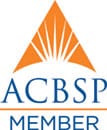
B.S. in Accounting
Add Success to Your Future Through an Accounting Degree
You’ve got a mind for business and a desire to make a difference. Regent’s ACBSP-accredited Bachelor of Science (B.S.) in Accounting degree program can equip you with the skills needed to become a crucial member of the public, private, or nonprofit business sectors. Take coursework in international business, strategic management, law and ethics, operations, and financial management—preparing you to sit for the CPA exam—taught from a Christian perspective.
ALIGN YOURSELF WITH EXCELLENCE
Regent has been ranked among the Top National Universities by the U.S. News & World Report (2024). Our programs have also ranked as the #1 Best Online Bachelor's Programs in Virginia 12 years in a row (2013-2024).
Learn more about undergraduate student achievement here.
SHARPEN YOUR SKILLS
Learn auditing, tax preparation, and laws for personal, corporate, and nonprofit business use.
BUILD ON A STRONG FOUNDATION
Anchor your knowledge and skill on Christian principles and values.
LEARN FROM THE BEST
Be mentored by faculty in Virginia Beach who hold the highest degrees in their field.
Explore Scholarships
Explore exciting scholarship opportunities such as academic merit scholarships, honors college scholarships, and more! Learn about the scholarships for on-campus incoming freshmen: the $10,000 Freedom Scholarships, $4,000 Homeschool Scholarships and $4,000 Private School Scholarships.
Please complete the Request Information form on this page to learn more about this program.
On completing the Bachelor of Science in Accounting, you can:
- Sit for the Virginia CPA exam.
- Analyze and prepare comprehensive business reports and financial statements.
- Understand internal systems to produce accurate and reliable accounting data.
- Demonstrate ethical, innovative business processes and investigative skills to deter organizational fraud.
Career Opportunities
- Auditing
- Managerial
- Banking
- Tax Planning
- Investment Analysis
- Financial Forensics
- Information Systems
Step 1: Apply to Regent University
Submit your application using the Regent University Online Application.
Note: If you are unable to complete our application due to a disability, please contact our Admissions Office at 757.352.4990 or admissions@regent.edu and an admissions representative will provide reasonable accommodations to assist you in completing the application.
Step 2: Submit Your Unofficial Transcripts
Submit your unofficial high school or college transcripts to regent.edu/items.
Upon submitting your application, you will receive an email requesting authorization for Regent University to obtain your official transcripts from your U.S. degree-granting institution. International transcripts must be evaluated by a NACES, AACRAO or NAFSA approved agency.
Step 3: Submit Your Government-Issued ID
To ensure academic integrity, Regent University requires a copy of a government-issued ID. Please submit a scanned copy or photograph of it to regent.edu/items.
Step 4: Submit Your FAFSA
Complete your Free Application for Federal Student Aid (FAFSA) at studentaid.gov Regent's school code is 030913.
Please feel free to contact the Office of Admissions at 757.352.4990 or admissions@regent.edu should you have any further questions about the application process.
Note: All items submitted as part of the application process become the property of Regent University and cannot be returned.
Invest in your calling with this accounting bachelor’s degree.
Regent University’s accounting programs are not designed by themselves to lead to initial licensure as a Certified Public Accountant (CPA). Many states may accept a conferred bachelor’s degree to permit an individual to sit for the CPA examination, but additional coursework may still be required for CPA licensure.
Each state independently determines academic requirements for licensure at their discretion and reserves the right to amend their licensure requirements at any time. Each state’s Board of Accountancy can supply you with additional information.
| Degree | Tuition Block Rate Per Semester | Credit Hours Per Semester | Tuition Rate Per Year |
|---|---|---|---|
| Students taking on-campus classes (fall & spring semesters) | $9,975 | 12 - 18 | $19,950 |
| Degree | Tuition Cost Per Credit Hour | Average Credit Hours Per Semester | Average Tuition Per Semester |
|---|---|---|---|
| Students taking on-campus classes (fall & spring semesters) | $665 | Under 12 | $7,980 |
| Students taking on-campus classes (fall & spring semesters) | $665 | Over 18 | $11,970 |
| Students taking on-campus classes (summer semester) | $665 | N/A | $1,995+ |
Student Fees Per Semester
| University Services Fee (On-Campus Students) | $850 (Fall & Spring) $700 (Summer) |
Housing Fees » | Military Admissions & Aid » | Cost of Attendance »
| Degree | Tuition Cost Per Credit Hour | Average Credit Hours Per Semester | Average Tuition Per Semester |
|---|---|---|---|
| Part-Time Students (3-11 Credit Hours Per Semester) | $450 | 6 | $2,700 |
| Full-Time Students (12+ Credit Hours Per Semester) | $395 | 12 | $4,740 |
Student Fees Per Semester
| University Services Fee (Online Students) | $700 |
| Degree | Tuition Block Rate Per Semester | Credit Hours Per Semester | Tuition Rate Per Year |
|---|---|---|---|
| Students taking on-campus classes (fall & spring semesters) | $9,493 | 12 - 18 | $18,986 |
| Degree | Tuition Cost Per Credit Hour | Average Credit Hours Per Semester | Average Tuition Per Semester |
|---|---|---|---|
| Students taking on-campus classes (fall & spring semesters) | $630 | Under 12 | $7,560 |
| Students taking on-campus classes (fall & spring semesters) | $630 | Over 18 | $11,340 |
| Students taking on-campus classes (summer semester) | $630 | N/A | $1,890+ |
Student Fees Per Semester
| University Services Fee (On-Campus Students) | $850 (Fall & Spring) $700 (Summer) |
Housing Fees » | Military Admissions & Aid » | Cost of Attendance »
| Degree | Tuition Cost Per Credit Hour | Average Credit Hours Per Semester | Average Tuition Per Semester |
|---|---|---|---|
| Part-Time Students (3-11 Credit Hours Per Semester) | $450 | 6 | $2,700 |
| Full-Time Students (12+ Credit Hours Per Semester) | $395 | 12 | $4,740 |
Student Fees Per Semester
| University Services Fee (Online Students) | $700 |
Other
For Virginia residents, this degree can help you be prepared to sit for the Virginia CPA exam, as it is designed to meet the directives of the Virginia Board of Accountancy CPA eligibility requirements.


